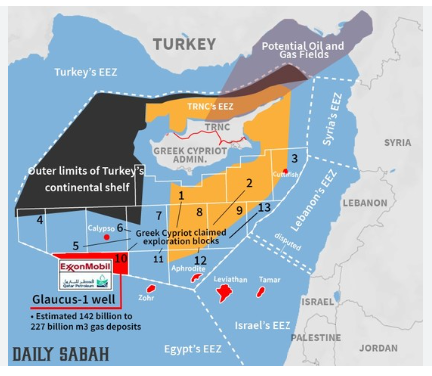Turkey’s president Erdogan has – on a visit to northern Cyprus – demanded the recognition of the breakaway state as a condition for negotiations on the future of the island. In this case, he is barking up the wrong tree. The international community and EU have no appetite fro a two-state soluti,on in Cypurs, where a sovereginty conflict raged since 1974. However “there is no logical reason why Cyprus should not serve as the conduit for the transport of Eastern Mediterranean gas via Turkey to Europe”, argues Robert Ellis in a bye-line for Jerusalem Post.
From 1975, reunification talks began on the island under the aegis of the UN with the declared aim of establishing a bizonal, bicommunal federation. A notable attempt in 2004, based on the Annan Plan for reunification, was accepted by 65% of Turkish Cypriots, but rejected by 76% of the Greek Cypriots. A week later, the rump state, designated as the Republic of Cyprus, found a safe harbor in the European Union.
The latest attempt
The latest attempt, in what UN Secretary-General António Guterres has called “a horizon of endless process without result,” foundered at Crans-Montana in Switzerland in 2017. Guterres was undoubtedly correct in his belief that a historic opportunity had been missed, as Ersin Tatar was elected Turkish Cypriot leader instead of the pro-federal Mustaf Akinci in October 2020.
Tatar, a hardliner and backed by Ankara, goes in for a two-state solution. Failing this, annexation is a third option, which is not unlikely, given that northern Cyprus is de facto Turkey’s 82nd province.
However, the game changer was the discovery of vast gas and oil reserves in the Levant Basin in 2010. Cyprus had already delimited its Exclusive Economic Zone (EEZ) and concluded agreements with Egypt, Lebanon and Israel. Turkey, which is not a signatory to UNCLOS (United Nations Convention on the Law of the Sea), insists that the extent of its continental shelf and shoreline overrides this principle.
The fact that Cyprus has awarded concessions to foreign companies for hydrocarbon exploration in its EEZ has led to continual conflict with Turkey, not least because it clashes with Turkey’s “Blue Homeland” maritime doctrine.
One response has been the trilateral cooperation between Greece, Cyprus and Israel, which has lasted a decade and includes a military dimension.
On another level, Egypt, whose Zohr gas field is the largest in the Mediterranean, in 2019 founded the East Mediterranean Gas Forum, which includes Israel, Cyprus, Greece, France, Italy, Jordan and the Palestinian Authority, but not Turkey. The US and the EU are observers.
In 2014, when Turkish professor Ahmet Davutoglu, the architect of Turkey’s “neo-Ottoman” foreign policy, was appointed prime minister, he included in his manifesto a vision of Turkey as an energy corridor.
In 2009, the European Commission agreed on the construction of a Southern Gas Corridor to diversify its energy supply by bringing gas resources from the Caspian Sea to European markets. Commissioned at the end of 2020, it comprises the South Caucasus Pipeline (SCP) from the Shah Deniz field in Azerbaijan, the Trans-Anatolian Pipeline (TANAP) through Turkey and Trans Adriatic Pipeline (TAP) to Italy.
Turkey has tried to lure Israel to commit to a pipeline from Israel’s Leviathan field to Ceyhan in southern Turkey, but so far Israel has resisted this siren call. Prime Minister Benjamin Netanyahu is trying to arrange a meeting with Erdogan, but Erdogan will only meet with him if he delivers news on gas cooperation.
Turkey is also dependent on Russian gas through the Blue Stream and TurkStream pipelines, and Russia has proposed to Turkey that it acts as an energy hub for Russian gas to Europe after the Nord Stream blasts.
In January 2022 a non-paper from the US State Department put the kibosh on Greece, Cyprus and Israel’s plans to construct a 1,900 km. EastMed pipeline to transport gas from the Levant Basin via Greece to Europe. One of the reasons given for canceling the project was “creating tensions in the region” i.e. don’t upset Turkey.
Against a background of a thaw in relations between Turkey and Egypt, due consideration must be paid to Egypt as a gas hub and the founder of the East Mediterranean Gas Forum (EMGF). For example, a memorandum of understanding (MOU) was signed in June last year between the EU, Egypt and Israel to export Israeli gas to Europe via two Egyptian LNG plants.
By the same token, there is no logical reason why Cyprus should not serve as the conduit for the transport of Eastern Mediterranean gas via Turkey to Europe. As Egypt’s ambassador to the United States, Motaz Zahran, has explained – the EMGF is “the perfect example” of a regional approach to address the Israeli-Palestinian issue and regional economic integration.
The same could apply to the Cyprus issue and the standoff in Eastern Med.
In the process, a number of camels will have to be swallowed, but according to Hatem Zadek, a professor at Helwan University, Mediterranean gas can fix what politics has spoiled.
The writer is an international adviser at RIEAS (Research Institute for European and American Studies) in Athens.
Follow our English language YouTube videos @ REAL TURKEY: https://www.youtube.com/channel/UCKpFJB4GFiNkhmpVZQ_d9Rg
And content at Twitter: @AtillaEng
Facebook: Real Turkey Channel: https://www.facebook.com/realturkeychannel/
